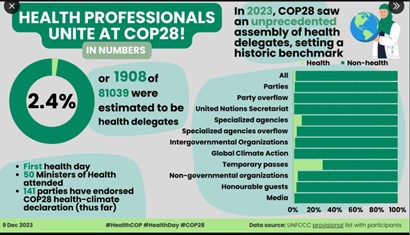International Journal of Medical Case Reports and Medical Research
OPEN ACCESS | Volume 5 - Issue 1 - 2026
ISSN No: 2994-6905 | Journal DOI: 10.61148/2994-6905/IJMCRMR
Gloria Maimela
Wits RHI, Faculty of Health Sciences, University of the Witwatersrand.
*Corresponding author: Gloria Maimela, Wits RHI, Faculty of Health Sciences, University of the Witwatersrand.
Received date: January 23, 2024
Accepted date: January 29, 2024
Published date: January 31, 2024
Citation: Gloria Maimela (2024) “Reflections on Climate Change and Health at COP28International Journal of Medical Case Reports and Medical Research, 2(1); 10.61148/2994-6905/IJMCRMR/025
Copyright: © 2024 Gloria Maimela. This is an open access article distributed under the Creative Commons Attribution License, which permits unrestricted use, distribution, and reproduction in any medium, provided the original work is properly cited.
,
Climate change has become a humanitarian crisis and is set to worsen as the world fails to reach the Paris agreed upon global warming target of not more than 1.5 degrees celsius above baseline. In his opening address on the Health Day at the United Nations Framework Convention on Climate Change (UNFCCC) Conference of Parties (COP)28 in Dubai, WHO Director General Tedros Ghebreyesus described health as “the most compelling reason for climate action”. The historical Health Day was held on the 3rd of December 2023 for the first time in the 28 years of COP meetings, following years of advocacy and lobbying. The focus of the Health Day was to i) showcase evidence and pathways between climate change and health; ii) promote health arguments for health day; iii) highlight needs, barriers and best practices for climate resilient health systems; iv) identify and scale adaptation measures; and v) take action at the nexus of health and relief, recovery and peace(1).
COP28 took place in the background of staggering statistics on the impact of climate change on health. According to WHO, over 3,6 billion people, the majority of whom live in disproportionately affected developing countries, are already vulnerable to the effects of climate change(2). Climate change is expected to result in an estimated 250 000 additional deaths per annum if no action is taken, this is as a result of ongoing heat stress, air pollution, malnutrition and a rising prevalence in climate sensitive vectors that include Malaria and Dengue(2).
Health Day was historic in that it was attended by over 50 Ministers of Health (compared to just 5 at COP27 in Egypt). Health Ministers were urged by Ghebreyesus to take responsibility in driving the climate and health agenda in collaboration with the Ministers of Environment, who have historically led negotiations at COP meetings. Over 100 countries participated in the first climate and health ministerial event and pledged to commit to transformative climate health action. Below is a summary of health delegate attendance at the conference.

Source: @LujainAlqodmani ???? https://t.co/gtqlvCgs3j
The Health Day was preceded by the COP28 UAE Declaration on Climate and Health(3), which has been endorsed by 141 countries as at 09 December 2023. The declaration emphasised “the need for urgency in taking action on climate change, and note the benefits for health from deep, rapid, and sustained reductions in greenhouse gas emissions”(3).
Health day was also supported through financial commitments of over 1 billion dollars from organizations that include the Global Fund ($500 million), Wellcome Trust (€100 million) and the Rockefeller Foundation ($100 million), to name a few. Funding has been allocated to advance climate and health research and to build low carbon sustainable and resilient health systems. Research gaps identified for further support include climate and health attribution studies, research on the impact of climate change on mental health especially in the youth and the effectiveness of adaptation and mitigation strategies. The need for research translation to support policy development and implementation and for public -private partnerships for health focused climate action were also emphasised throughout COP28 climate and health discussions. The WHO Alliance for Transformative Action on Climate and Health (ATACH) project dominated discussions at the WHO led Health Pavillion. The ATACH project aims to support countries to implement their COP26 health initiatives.
Despite strides made in ensuring health is incorporated into the COP28 agenda, health is still at the periphery of COP discussions and is yet to be included in main negotiation streams. Health remains a subtext in the three COP negotiation streams that include the loss and damage fund (LDF), the global goal on adaptation (GGA) and the global stocktake (GST). The convergence of country positions and consensus on the specific health text to be included in the three streams is a stumbling block to the inclusion of health in future COP negotiations. There is also a need for member states to reach consensus on health indicators to be included to track progress. The role of Ministries of Environment vs Health remains a challenge especially in countries where these operate in silo.
What this COP has successfully achieved however, is making it clear, with persuasion from vibrant advocacy, that COP can no longer afford to neglect the impact of climate change on health. The need to invest in climate and health resources to avoid human catastrophe was made critical and urgent. A clear call was made to include health in COP29 negotiations and beyond. The science to inform action is available and with further investment into capacity building, can be inclusive of key scientific evidence and indigenous knowledge from the global south. It was also made clear that evidence needs to rapidly translate into policy and implementation. It is therefore hoped that future COPs will build on the groundwork laid by health at COP28 for the benefit of all, especially the most vulnerable.